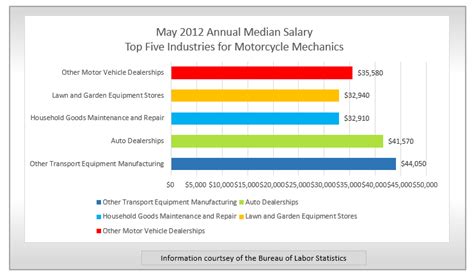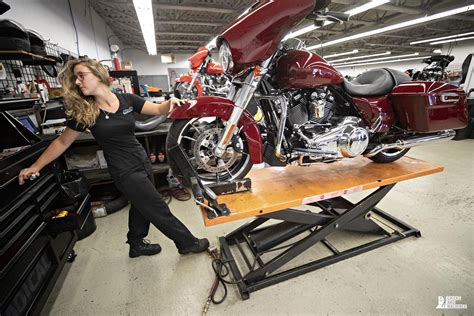For those with a passion for engines, a love for the open road, and a knack for troubleshooting, a career as a motorcycle mechanic can be incredibly rewarding. It’s a hands-on profession that combines technical skill with a deep appreciation for the engineering of two-wheeled machines. But beyond the satisfaction of a perfectly tuned engine, what is the financial potential of this career?
This guide provides a data-driven look at the salary for a motorcycle mechanic. You can expect a median salary in the range of $43,000 to $48,000 per year, but top-tier professionals with specialized skills can earn upwards of $66,000 annually or more. We'll break down the key factors that influence your earning potential, from your location to your level of expertise.
What Does a Motorcycle Mechanic Do?

Before diving into the numbers, it's essential to understand the scope of the role. A motorcycle mechanic, also known as a motorcycle technician, is a specialized professional responsible for the inspection, maintenance, repair, and customization of motorcycles, scooters, and all-terrain vehicles (ATVs).
Their daily responsibilities typically include:
- Diagnosing issues using computerized tools and hands-on inspection.
- Performing routine maintenance, such as oil changes, tire rotations, and chain adjustments.
- Repairing and replacing parts, from brake pads and engines to complex electrical systems.
- Assembling new motorcycles for dealerships.
- Installing custom parts and accessories to enhance performance or aesthetics.
- Advising customers on proper care and maintenance.
It’s a role that demands a sharp mind for problem-solving, excellent manual dexterity, and strong customer service skills.
Average Motorcycle Mechanic Salary

Salary data for motorcycle mechanics can vary slightly depending on the source, which often reflects different data collection methods (government surveys vs. real-time, self-reported data). By looking at multiple authoritative sources, we can get a comprehensive picture of the earning landscape.
According to the U.S. Bureau of Labor Statistics (BLS), the median annual wage for motorcycle mechanics was $43,760 as of May 2023. This means that half of all mechanics earned more than this amount, and half earned less. The BLS provides a broad range to illustrate the potential for growth:
- Lowest 10%: Earned less than $31,680
- Median (50%): $43,760 per year ($21.04 per hour)
- Highest 10%: Earned more than $66,130
Reputable salary aggregators, which often use real-time data from job postings and user submissions, report similar figures, sometimes slightly higher. For example:
- Salary.com reports that the median motorcycle mechanic salary in the United States is around $48,011, with a typical range falling between $42,656 and $53,733.
- Payscale notes an average base hourly rate of around $21.49, with total annual pay (including potential bonuses and overtime) ranging from $34,000 to $70,000.
These figures show a solid foundation with significant room for financial growth as you build your skills and experience.
Key Factors That Influence Salary

Your base salary is just a starting point. Several key factors can dramatically impact how much you earn over your career. Understanding these variables is crucial for maximizing your income potential.
### Level of Education and Certification
While a high school diploma is the minimum requirement, formal training can give you a significant competitive edge and a higher starting salary. Attending a postsecondary program at a technical school, such as the Motorcycle Mechanics Institute (MMI) or Universal Technical Institute (UTI), provides structured, hands-on training that employers value.
More importantly, manufacturer-specific certifications are a primary driver of higher wages. Technicians certified by brands like Harley-Davidson (H-D Master Technician), BMW, Honda, or Ducati are in high demand at dealerships. These certifications prove you have an expert-level understanding of that brand’s specific technology, making you a more valuable asset and commanding a higher salary.
### Years of Experience
Experience is arguably the most significant factor in a mechanic's salary. As you progress in your career, you move from basic maintenance tasks to complex diagnostics and repairs, making you more efficient and profitable for your employer.
- Entry-Level (0-2 years): Mechanics at this stage are learning the fundamentals and often work under supervision. Their pay will typically fall in the lower range, from $32,000 to $40,000.
- Mid-Career (3-9 years): With several years of experience, these technicians can work independently, tackle more complex jobs, and may have earned a few certifications. Their salary often aligns with or exceeds the national median, in the $43,000 to $55,000 range.
- Senior/Master Technician (10+ years): Highly experienced mechanics, especially those with multiple master-level certifications or shop management responsibilities, are top earners. They can command salaries well above $60,000, with some earning over $70,000, particularly if they are paid on a flat-rate or commission basis.
### Geographic Location
Where you work matters. Salaries for motorcycle mechanics vary by state and even by metropolitan area due to differences in cost of living, demand, and riding seasons.
According to BLS data, the top-paying states for motorcycle mechanics are often those with a high cost of living and a strong, year-round riding culture. As of May 2023, some of the top-paying states include:
1. Washington: Annual mean wage of $59,340
2. New Jersey: Annual mean wage of $55,590
3. California: Annual mean wage of $53,770
4. New York: Annual mean wage of $53,730
5. New Hampshire: Annual mean wage of $51,690
Conversely, states with a lower cost of living may offer lower base salaries, but your take-home pay might go further.
### Company Type
The type of shop you work for also plays a major role in your earnings and career path.
- Dealerships: Working for a large, brand-specific dealership (e.g., Harley-Davidson, Honda, BMW) often leads to higher earning potential. Dealerships typically offer manufacturer-paid training, better benefits, and a structured pay system, which can include a flat-rate pay model where you earn more by completing jobs faster than the standard time.
- Independent Repair Shops: These shops offer a chance to work on a wide variety of makes and models. While the base pay might be hourly and sometimes lower than at a dealership, experienced mechanics can still earn a competitive wage. Top performers may have the opportunity to become a shop manager or partner.
- Self-Employed/Shop Owner: The ultimate earning potential lies in owning your own repair or custom shop. While it comes with the risks of entrepreneurship, successful shop owners have no ceiling on their income, with many earning well into the six figures.
### Area of Specialization
Developing a niche skillset can make you an indispensable expert and significantly boost your pay. Specialized areas include:
- Performance Tuning and Dyno Operation: Mechanics who can expertly tune engines for maximum horsepower using a dynamometer are highly sought after.
- Customization and Fabrication: Building one-of-a-kind custom bikes requires both mechanical and artistic skill and can be very lucrative.
- Vintage and Classic Motorcycle Restoration: Restoring classic bikes to their former glory is a specialized craft that commands premium labor rates.
- Advanced Diagnostics: Becoming the go-to expert for solving complex electronic or engine problems that stump other mechanics makes you invaluable.
Job Outlook

According to the U.S. Bureau of Labor Statistics, overall employment for motorcycle mechanics is projected to see a slight decline of 1 percent from 2022 to 2032, which is slower than the average for all occupations.
However, this statistic doesn't tell the whole story. The BLS still anticipates about 6,900 job openings for motorcycle mechanics each year, on average, over the decade. These openings are expected to result from the need to replace workers who retire or transfer to different occupations. This means that while the field isn't rapidly expanding, consistent opportunities will be available for skilled and well-trained new mechanics.
Conclusion

A career as a motorcycle mechanic offers a stable path for those who are passionate about the trade. While the median salary is modest, it provides a solid foundation with clear pathways to a much higher income. The key takeaways for maximizing your earning potential are:
- Invest in Formal Training: A degree or certificate from a reputable technical school will set you apart.
- Pursue Certifications: Manufacturer-specific credentials are your ticket to higher pay at dealerships.
- Gain Diverse Experience: Don't be afraid to move from basic maintenance to complex diagnostics and specialized work.
- Consider Your Niche: Specializing in performance, customization, or a specific brand can make you a high-demand expert.
By combining technical skill with a commitment to continuous learning, you can build a financially secure and personally fulfilling career doing what you love.
